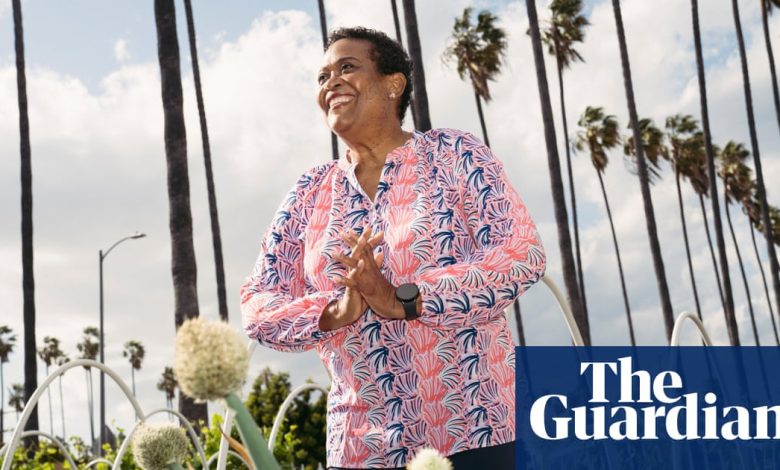I swapped my south LA lawn for a verdant microfarm – now I feed the neighborhood | Environment

To Beverly Lofton home in the south Los Angeles there was a grassy meadow that absorbed water. Today, it’s a green micro-farm that uses solar energy and recycled water to grow carrots, beets, potatoes and more, with the prize being distributed to its neighbors. The 67-year-old’s replacement was a bold move in a city ruled by cars and concrete, and where the effects of extreme heat and water shortages are being felt acutely. It is also a powerful rebuttal to food insecurity and large scale agriculture, in a neighborhood considered a “food desert”.
I I moved to the Hyde Park neighborhood of South Los Angeles in 1988. At the time, my future husband lived next door. That’s how we met. I moved in with him in 1989 and have lived in this house ever since – it was the easiest move I ever made.
In 2020, during the pandemic, I contacted Crop Swap LA, a local group that turns unused spaces like front lawns into sustainable microfarms in a way that creates jobs and conserves water—and then fairly distributes the food grown on them. Their goal is to have micro farms in places most affected by food insecurity and food apartheid. My neighborhood was called a food desert. Grocery stores and other stores continue to close as more apartment-style housing is built.
We started the conversion in 2021 and celebrated the grand opening in 2022. Lots of people always walk by with their dogs and kids in strollers to see the progress – always a talking point. Crop Swap LA took out all the grass and I was able to get a $4,500 rebate from the Los Angeles Department of Water and Power for the grass that was removed.
They installed a tank and six raised beds and a drip irrigation system that uses recycled water. We’ve had so much rain lately and it’s all getting caught in the tank. Before the conversion my front lawn was mostly grass and with the drought and all the watering costs the water bill was about $400 each month. The bill I just got this week for water was $37.63 for two months, so that’s just an amazing amount of savings.
We grew lots of dark leafy greens, bok choy, green leafy greens, string beans. Crop Swap LA also grows carrots, beets, radishes, potatoes and anything that needs a deeper root system in grow bags called GardenSoxx. And we have a vine, so we’ll have Concord grapes this year. The micro-farm is solar-powered and has on-site composting. I wasn’t surprised that all this stuff could grow because when we renovated our house in 2006 a crew tore up the grass and it came back. Everything that has roots wants to grow on this earth.
Since the microfarm is part of Crop Swap LA, their team members come and maintain the garden several times a week and I got to know many of the workers. They harvest on Sundays, when I’m usually at church, and often leave me samples of that day’s harvest. Crop Swap LA offers affordable memberships to neighbors within a mile radius of my house and they receive at least 2lb each week of freshly picked vegetables and fruit.
The feeling that food grown in my front yard is feeding people in our neighborhood is amazing. Most people who see the microfarm are excited that it’s in the community and sometimes offer advice or stories about their gardening experiences or desire to start planting. A gentleman stopped by to show me pictures of his garden. It’s even better when Crop Swap LA workers are here because they can share their expertise and encourage everyone to participate in improving our community.
When I was a kid, my grandparents lived 1.5 miles from where I am now and had a beautiful backyard garden, but I never learned the science of planting, pruning, and harvesting from them. I feel like I’ve redeemed myself. It’s very satisfying and I don’t understand why more people don’t do it, especially with the discount program we have here. I hope I can be an example of what is possible.
I retired in 2012 after working as a financial operations consultant for the Los Angeles County Department of Education. My husband passed away in 2016 so it’s been just me ever since. After hearing the story of how I met my late husband, La Salle Lofton Sr, Crop Swap LA allowed me to name the microfarm after him. La Salle loved to cook and also to feed people. He would love the idea of having a front yard garden that would benefit our family and neighbors.
-
The DIY Climate Changers is a series about everyday people in the US using their own ingenuity to tackle climate change in their neighborhoods, homes and backyards. If you’d like to share your story, email us at diyclimate@theguardian.com.




